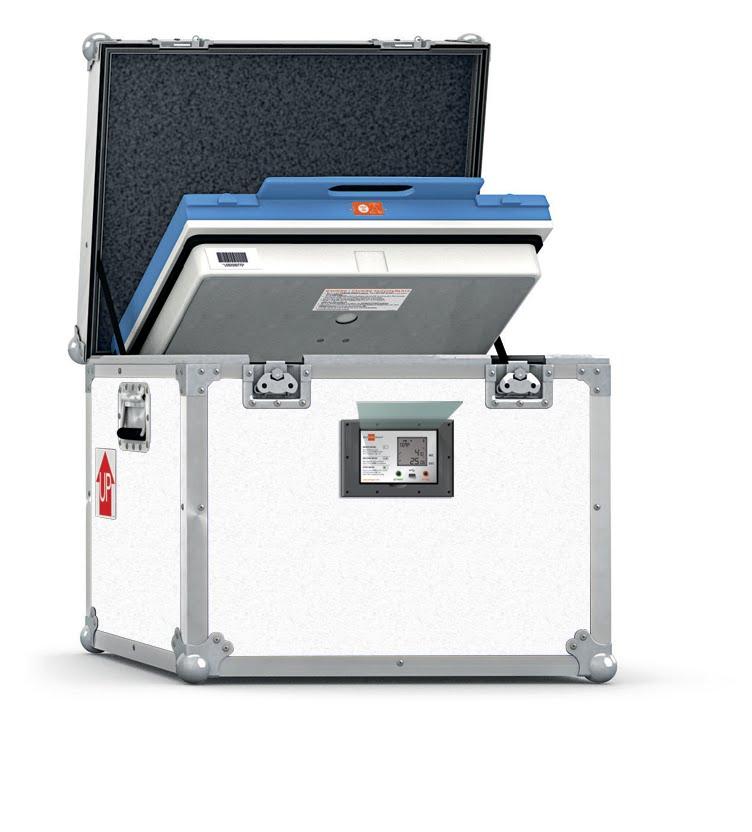Temperature traceability
Safeguarding the integrity of medicines: a requirement that must be satisfied while they are in transit
Compliance with the cold chain is one of the fundamental principles of the pharmaceuticals industry with regard to the transportation of medicines. It safeguards the integrity of vaccines, insulin and cancer-inhibiting drugs, as well as other heat-sensitive medicines. These very expensive products (it is by no means rare to see eye drops on sale for more than 1,000 euros) require forms of packaging, modes of transport and traceability up to the value. Thus, measures must be taken in order to ensure that the products are transported under ideal conditions and maintained at the correct temperature throughout the journey. Traceability of temperatures is one of the appropriate responses to the secure transportation of medicines under controlled temperature conditions.

Manufacturers, distributors, pharmacies: these are all responsible for the satisfactory temperature conditions of the transported medicines!
In France, at each link in the chain, the Public Health Code insists on guarantees regarding the conservation of heat-sensitive healthcare products. This applies to the manufacturers of medicines, the wholesale distributors and the pharmacists. Each of them must be able to prove satisfactory conservation of the product.
On arrival, the integrity of the products is verified by checking the documents relating to traceability of compliance with the cold chain.
More generally, the Good Distribution Practices of Medicines devotes several paragraphs to the responsibility of transporting heat-sensitive medicines, clearly identifying the responsibilities of everyone involved:
- Pharmaceutical responsibility of the company in charge of the shipment is assumed throughout the logistical operations, until the pharmaceutical product is delivered to the consignee; this applies even if the company in charge of the shipment has assigned the task to an intermediary acting on its behalf. The company in charge of the shipment must deploy control and risk analysis resources and evaluate the ability of subcontractors to transport the products under satisfactory conditions. If the pharmaceuticals haulage contractor is not the client for all or part of the shipment and if, in consequence, the consignee company substitutes its own haulage contractor for the pharmaceuticals haulage contractor by appointing its own haulage subcontractor, it is the consignee pharmaceuticals company that assumes responsibility for transport and for compliance with the cold chain from the moment that the products are collected by their appointed haulage contractor; this applies until the products are delivered to its premises.
- The consignee company assumes responsibility in terms of marinating the cold chain for the products placed in his care. Therefore, it must be informed about the special protective conditions to be applied and it must ensure that they are applied correctly; in particular, the consignee company must ensure that, as soon as they are received at its premises, the products are accepted and immediately stored at the required temperature. In the event of any doubt when the inspections on delivery are conducted, the products must be isolated and identified as being in quarantine, pending instructions from the dispatching pharmaceutical laboratory, which has sole authorisation to specify the further action to be taken in relation to the dispute.
An insulated container which ensures that products in transit are maintained at the correct, monitored temperature!

The iBox from Sofrigam, a cold chain container with a temperature-monitoring system
Well, does a stand-alone container guarantee strict maintenance of temperature at +5 °C, comprehensive traceability and proof of the maintenance of temperature from the time of acceptance of the products?
The iBox is a unique, semi-active refrigerating box, specially designed for transporting pharmaceutical products with a high added-value (clinical trials, orphan medicines, etc.).
An intelligent container with on-board electronics, it accurately maintains the temperature, with constant recording of the internal and ambient temperatures to ensure traceability of temperatures throughout the period of transit. This is achieved with the aid of:
- Its automatic temperature control system: this is inspired by a technology developed by NASA. In fact, the eutectic plates are stored in a box which automatically stabilises the temperature of the contents at +5 °C.
- Its temperature recorders: they accurately monitor the internal and ambient temperatures to provide comprehensive information of the conditions under which the products are transported.
- Its LCD screen: located on the front panel of the box, it allows instant access to the internal temperature data in order to verify that no temperature fluctuations have occurred, so that the batch can be released immediately.
- Its Plug&Play technology: this is used to retrieve the recorded temperature data.
An impressive combination of technological and thermal efficiency, nonetheless the iBox is very easy to use and ensures total control of shipment of pharmaceutical products via the cold chain.
